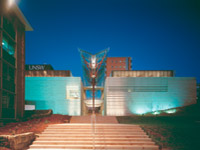Energy Efficient Lighting and Equipment - GSOE9142
Faculty: Faculty of Engineering
School: School of Electrical Eng and Telecommunications
Course Outline: http://www.eet.unsw.edu.au
Campus: Kensington Campus
Career: Postgraduate
Units of Credit: 6
EFTSL: 0.12500 (more info)
Indicative Contact Hours per Week: 2
CSS Contribution Charge: 2 (more info)
Tuition Fee: See Tuition Fee Schedule
Further Information: See Class Timetable
View course information for previous years.
Description
- For non-award students, the appropriate background is normally a Bachelor of Engineering. Other Bachelor degrees in Science, Commerce and Law might be acceptable.
- This course will be offered through flexible delivery or “blended-online” mode, combining three face-to-face workshops, with online activities and workplace-based learning. The course can be taken to contribute towards an Engineering Masters program (as 6 Units of Credit), or be taken as non-Award (without academic assessment), contributing instead towards Continuing Professional Development (CPD).









